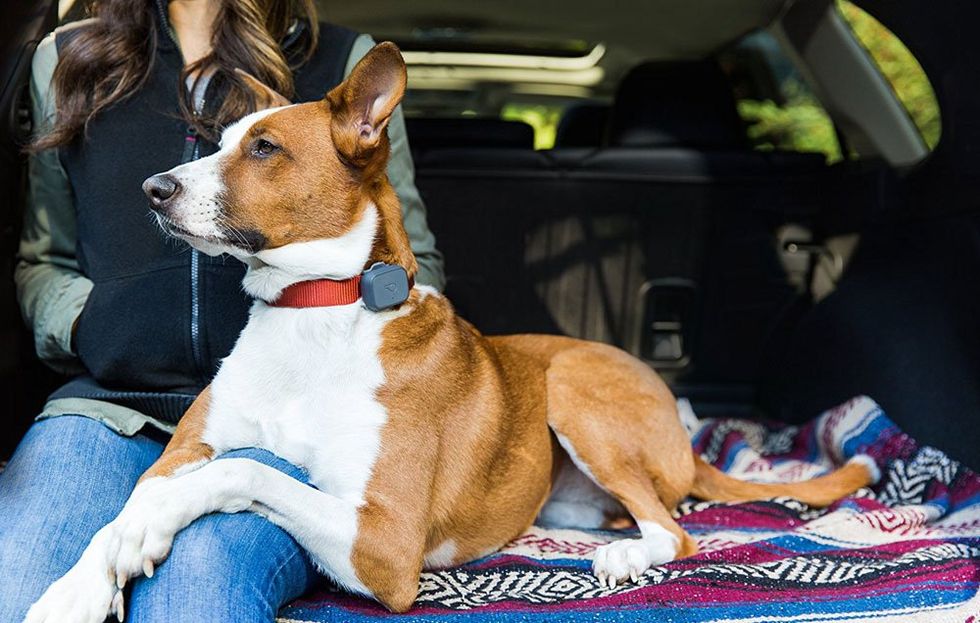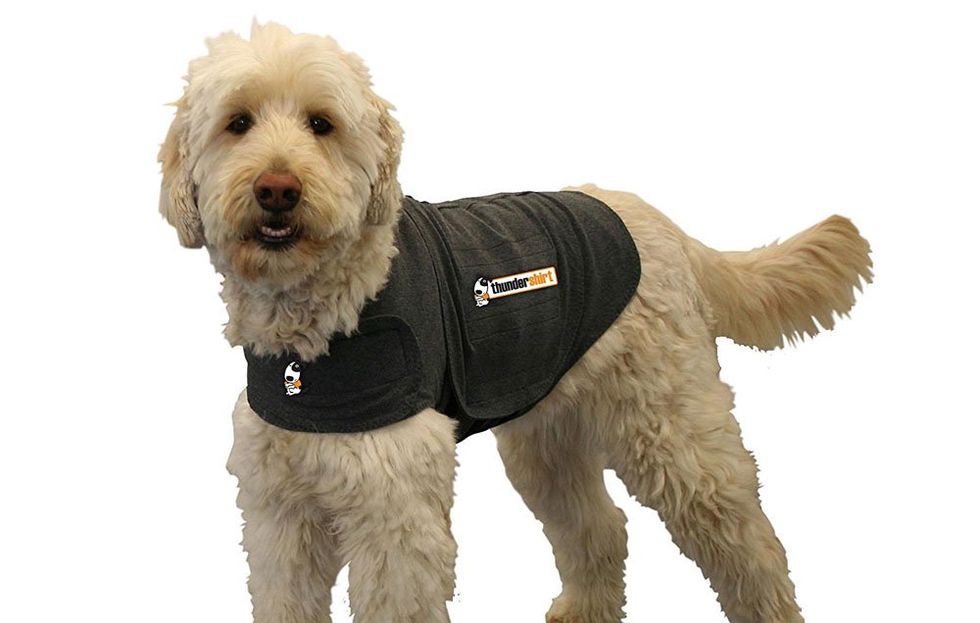Did you know that 4th of July weekend (and the days that follow) is the busiest time of year for animal shelters? It’s a sad statistic, but one that makes sense—dogs and cats freakin’ hate fireworks. Think about it: Those bomb-like noises and bright flashes of light, all at a time of night when they’re normally snuggled up inside, are probably pretty darn horrifying.
So it’s to be expected that pets will hide out or freak out—and if given the opportunity to go outside, many will try to run off in search of a safer, quieter place, even if that means running away from you and not being able to find their way home.
Whether you have a dog or cat that’s typically anxious or not, it’s always important to take precautions to keep any pet calm and safe during this noisy time of year.
Here, we’ve outlined 9 expert-approved tactics to keep your pet from panicking and give you peace of mind.
(Like what you're reading? Sign up for our newsletter to get health insights, clever kitchen tricks, gardening secrets, and more—delivered straight to your inbox.)
Don’t Let Your Pet Outside
Nope, do not—I repeat, do not—bring your dog along to your local fireworks display. Don’t even let them outside at your own home when fireworks are going off nearby (which is typically between 8pm and 12pm). What’s a fun and visually stunning display of patriotic pride for you is a seeming war zone for your pup and will certainly trigger their “flight” instinct. If you absolutely have to take your dog out to pee, make sure he's on a leash. "Dogs can and will climb over 8 foot or taller fences when scared," says veterinary behaviorist Meredith Stepita, DVM.
Related: 5 First-Aid Essentials Every Pet Owner Should Know
Make Sure They're Tagged And Microchipped
Of course, you still need to prepare for the chance that they will slip out and escape. "That’s why it’s essential to make sure your pet has proper identification such as tags and/or a working microchip in case they run off," says Susan Nelson, DVM, clinical associate professor at Kansas State University College of Veterinary Medicine.
Want to go high tech? There are also a number of pet GPS trackers available online. These include a device that attaches to your pet's collar, which, when your pet runs away, connects via 3G cell phone service to an app on your phone to give you their location. One highly rated option on Amazon.com is the Whistle 3 GPS Tracker & Activity Monitor (shown below).
Create A Safe, Quiet Space
You’ll want to do your best to minimize loud noises and flashing light in your home and create a comfortable environment. A good first step is to close your windows and draw the blinds. To drown out the noise further, you can turn on the TV, download an app such as Simply Noise that let's you play calming white noise through your smart phone or computer, or play music that pets naturally find relaxing, suggests Stepita. This includes reggae and jazz.
If your pet has a crate—and enjoys being in it—make sure it’s in an easily accessible spot with its door open. "Placing a blanket over the crate can add an extra sense of security," says Nelson.
If you have a safe, comfortable basement, this can also be a great place for your pet to wait out the festivities. And don’t be surprised if your dog or cat decides to hide out under someone’s bed. If they do, let them stay there.
Distract Your Pet With A Game
This tactic works best when your pet is just beginning to get anxious. Encourage them to engage in any activity that captures their attention and distracts them from behaving fearfully such as playing indoor fetch with a tennis ball or practicing some simple commands, suggests The Humane Society of the United States. And, of course, reward them with plenty of healthy treats.
Related: How To Give Your Dog Or Cat A Relaxing Massage
Invest In Some Anxiety-Reducing Gear
Those Thundershirts (shown below) might make your pet look funny, but they really can make a difference. (And not just during thunderstorms or fireworks.) The wraps work by swaddling your dog or cat and applying gentle, continuous pressure, which is thought to help reduce fear, says Stepita.
Other potentially helpful wearables: Tinted dog sunglasses (aka “doggles”) to block out flashing lights or Mutt Muffs and Happy Hoodies to muffle loud noises.
Consider Supplements
Popular natural products such as Bach’s Rescue Remedy, which contains flower essences, could help your four-legged friend chill out. But there are other options that may be even more effective, says Stepita. Namely, Zylkene—a supplement derived from milk protein that findings suggest can inhibit certain neurotransmitters in the brain, calming nervous activity. Another option is Solliquin, a supplement containing calming natural ingredients like l-theanine (found in green tea), magnolia, phellodendron, and whey protein concentrate. These are thought to increase feel-good neurotransmitters like serotonin and dopamine, Stepita says. Of course, consult with your vet before starting your dog on a new supplement.
Related: 3 Mistakes Even Good Pet Owners Make
Diffuse A Relaxing Scent
Just like how a whiff of lavender essential oil might leave you feeling more relaxed, this flower essence can help do the same for pets. Consider diffusing a lavender essential oil, or putting a few drops onto a bandana that your dog will wear throughout the evening, says Nelson. But never put essential oils directly on your pets. (Here are the 5 best eco-friendly essential oil diffusers.)
Another option is to purchase a diffuser that emits an odorless vapor that mimics calming pheromones for dogs or cats, like the Comfort Zone Diffuser, suggests Nelson.
Project Calmness
This may seem obvious, but many pets—dogs especially—will become more fearful if they sense their owner is nervous, says Nelson. (Here are 10 quick and easy ways to de-stress in under a minute.)
Seek Professional Help
If you’re dog or cat has exhibited extreme anxiety to fireworks in the past, they may need a short course of prescription anti-anxiety medication to keep them from harming themselves, says Nelson. So speak with your veterinarian if that’s the case.
You may also want to consider meeting with a board-certified veterinary behaviorist or certified applied animal behaviorist, says Stepita. They can help you put together a specific plan to change your pet’s underlying emotional response—so they can get back to their happy, tail-wagging self.















